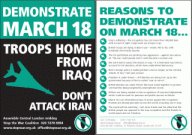"Britain's casualties of Iraq war total 6,700"
"Almost 6,700 Britons have needed hospital treatment in Iraq since the invasion three years ago - almost as many as the total number of British troops still stationed there. About 4,000 were sufficiently injured or ill to be sent home to Britain...
Even now the MoD admits that some British casualties may have been overlooked, particularly during the invasion itself, "when the tempo of operations meant that some minor injuries may not have been reported in the heat of the action". They also said that they cannot keep a central record of all casualties because it might breach "patient confidentiality"...
Labour MPs were staggered by a total for all casualties equivalent to almost the entire British presence in Iraq today. Mr Reid said this month that the number of British troops stationed there is to be cut by 800, to just over 7,000.
Ian Gibson, one of the Labour MPs who has been demanding to know the full casualty figures, said he would write to Mr Reid to ask how many of the 4,000 medical evacuees needed hospital treatment after their return to the UK, and where they were treated.
"MPs will want to know whether any of their constituents are among those 4,000 and whether they are in hospital locally, because if they are they will want to visit them," he said. "Ministers might even like to visit them," he added.
Peter Kilfolye, a former defence minister, whose home city of Liverpool is being visited today by the US Secretary of State, Condoleezza Rice, said: "The first thing that strikes me is when Jack Straw and Condoleezza Rice are strutting around here, perhaps they should be looking at these figures.
"The MoD is finding it extremely difficult to get their figures right. I welcome the fact that they have now made these figures public, but they show that we are paying a far higher price than we realised for what is not a very productive role in Iraq. This is an argument for getting our troops out."
Until this year, the MoD refused to give any casualty figures other than the number of Britons killed in action, which has reached 103. In January, Mr Reid gave out a figure for the number of wounded, but the figure he gave - 230 - raised immediate suspicion that it was too low."
For the full article go here
Best of the web
- Migliori Siti Di Poker Online
- Casinos Not On Gamstop
- Non Gamstop Casino
- UK Casinos Not On Gamstop
- UK Casinos Not On Gamstop
- UK Casinos Not On Gamstop
- Casino Non Aams Italia
- Meilleur Casino En Ligne
- τα καλυτερα Online Casino
- Casino Not On Gamstop
- UK Online Casinos Not On Gamstop
- Gambling Sites Not On Gamstop
- Casino En Ligne France
- Trusted Non Gamstop Casinos
- UK Casinos Not On Gamstop
- UK Casino Not On Gamstop
- UK Casino Not On Gamstop
- Non Gamstop Casino Sites UK
- Non Gamstop Casino
- Online Casino Nederland
- UK Casino Sites Not On Gamstop
- Lista Casino Non Aams
- UK Online Casinos Not On Gamstop
- Casino Non Aams Sicuri
- Bitcoin Casino



